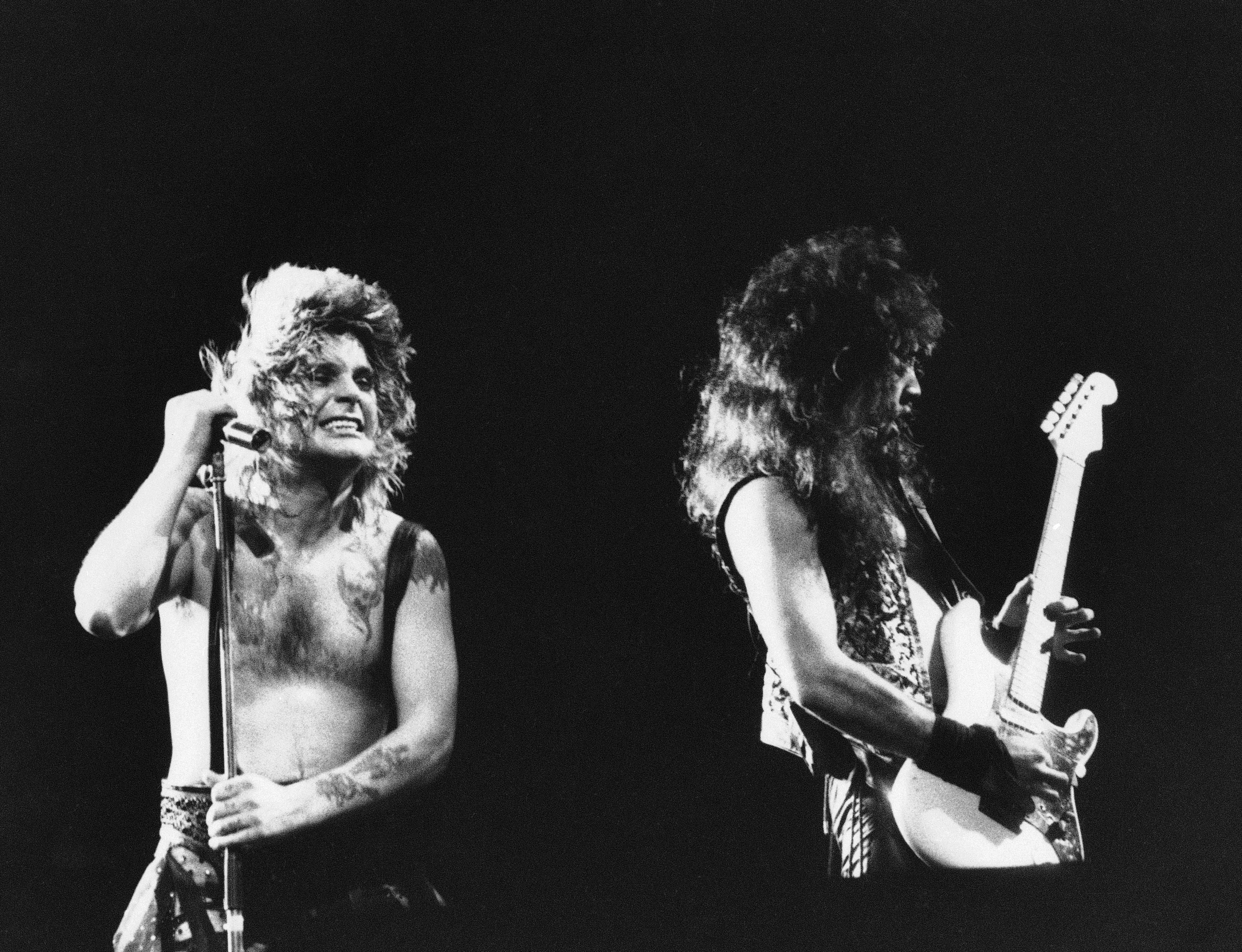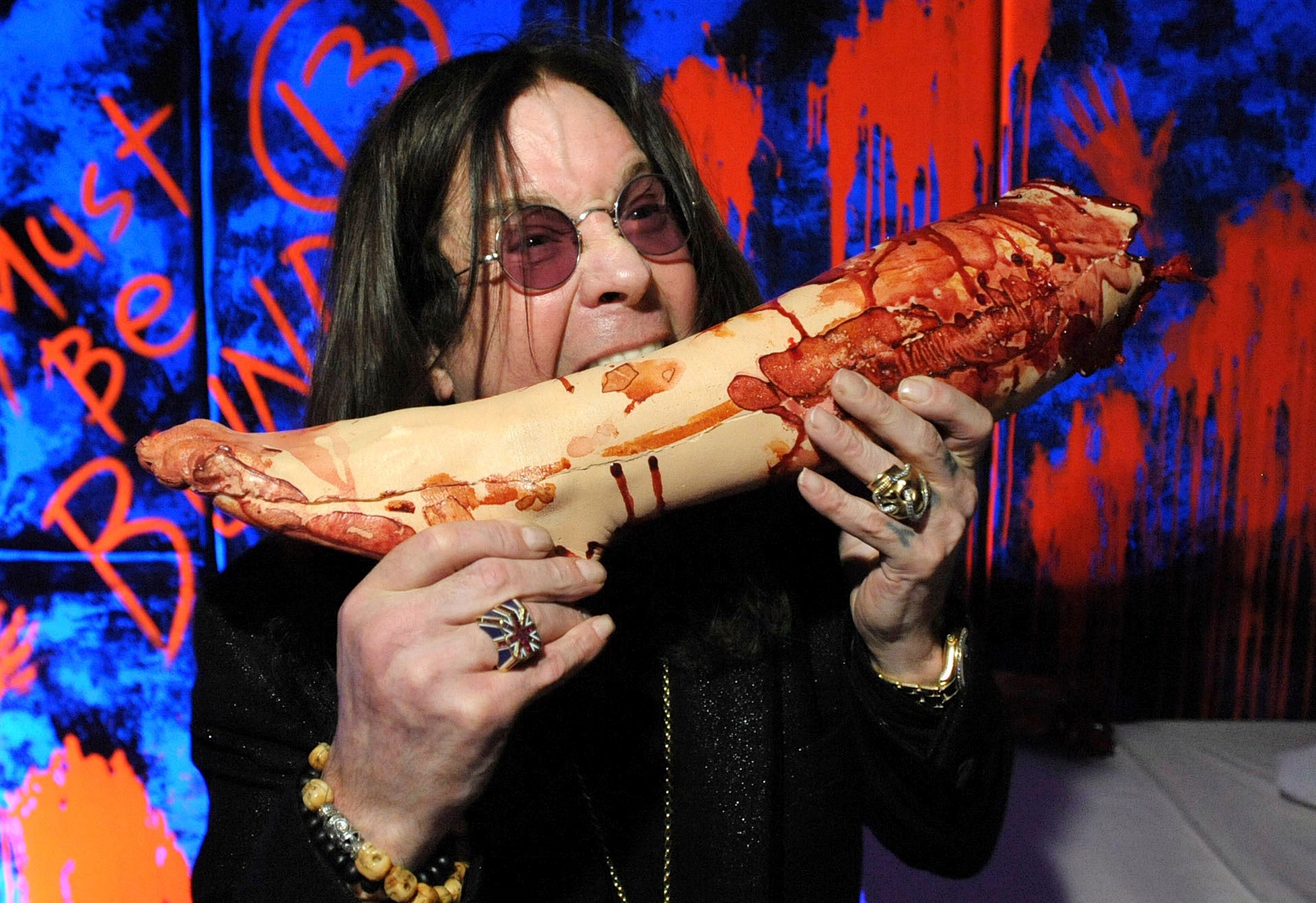And so the Prince of Darkness, long famed for his startling entrances – emerging from replica gothic castles, opening record label meetings by biting the head off a dove – makes the grandest exit of them all. Just two weeks before his death, Ozzy Osbourne rose from the stage at Villa Park in his hometown of Birmingham for his final show, resplendent on a black throne crowned with bat wings. He was unable to stand due to his deteriorating health, but still more than capable of captivating a stadium with his maniacal glare and wild, lycanthropic performance.
All day, at an event dubbed Back to the Beginning, this writer had watched rock icon after rock icon take the stage to pay tribute to Osbourne and Black Sabbath, the original lineup reforming for the first time in 20 years to mark Ozzy’s last stand. Metallica, Guns N’ Roses, Steven Tyler, Tool, Slayer, Billy Corgan, Tom Morello and dozens more put all status and ego aside to perform the music and hail the influence of this heavy metal originator and figurehead. “I will get back on stage if it f***ing kills me, because if I can’t do it then that’s what’s gonna happen anyway, I’m gonna f***ing die,” he told The Independent, during a period he would later describe as being “laid up” for six years.
That Ozzy got his wish, and amid such a loud and star-studded outpouring of affection – arguably the most momentous single gig in metal history – was an amazingly Hollywood ending for a life and career of such drama, delirium and dark chaos. Such cultural significance, too. After all, barely a handful of musicians could be said to have both originated and encapsulated a vastly successful genre that changed music forever. Ozzy Osbourne was among them.
When this former labourer, car-horn tuner and abattoir worker and his band Earth (guitarist Tony Iommi, bassist Geezer Butler and drummer Bill Ward) renamed themselves Black Sabbath in 1969 after a cult 1963 horror movie – drenching their 1970 debut album in the sounds of thunder and church bells, occult narratives and references to Satan, Tolkien, death and paganism – they captured the murky essence of the post-psychedelia comedown. Within Iommi’s down-tuned guitar and Osbourne’s swooping banshee vocal, the darkness of the heroin-infested late-Sixties blues rock scene met the societal paranoia that followed the Manson murders and the Stones at Altamont. Add a knowing, somewhat schlocky adoption of the increasingly violent and Satanic imagery of the era’s horror cinema and, somewhere deep in the tarry earth of Seventies rock music, a black egg cracked and out crawled heavy metal.
Black Sabbath’s influence was legion. The lower Iommi tuned his strings by 1971’s Masters of Reality album – in order to make it easier to play guitar, having lost the tips of two fingers in a sheet metal factory accident aged 17 – the more Sabbath became responsible for doom metal in all its sonorous, tentacles-across-the-ocean-floor forms. The faster Osbourne squealed on 1970’s seminal single “Paranoid”, the quicker he summoned speed and thrash rock – and even punk – into being.
But such sounds, no matter how evocative, would never have stuck so deeply into rock’s flesh had Ozzy not been as deranged and diabolical a conduit. Though Sabbath’s lyrical intention was often quite hippie-leaning (“War Pigs” condemned Vietnam; “Sabbath Bloody Sabbath” attacked the blood-sucking music industry establishment; “Children of the Grave” imagined the youth rising up in the name of love and peace), Osbourne himself personified metal as a raving, hell-bound lunatic, fully devoted to the nightmarish conceit. He sang of black masses and apocalyptic iron men with genuine menace and soul-staring intensity, a wild-eyed wolfman with a liver of steel.
“One of the problems I found with alcohol was I only had one f***ing mouth,” he told me in 2010. While other rock’n’roll hedonists lived fast and died young, this cackling maniac kicked away the claws any time the devil came to claim him. When he was thrown out of Sabbath in 1978 due to his excessive substance abuse (he admitted to taking LSD every day for two years in Sabbath’s heyday), he spent his £96,000 pay-off on a three-month “last party” of cocaine and alcohol. Yet he re-emerged with 1980’s landmark solo debut Blizzard of Ozz to multi-platinum success that was the envy of his fading former band. Ozzy’s sheer survival – particularly while singing songs about occult figures such as “Mr Crowley” – gave credence to the unearthly metal myths, and offered all the proof that fans needed that there really might be some dark arts at work.
That solo success was maintained for decades. No matter how corny or Tales From the Crypt the aesthetic of records like Diary of a Madman (1981) or Bark at the Moon (1983) became, they sold by the tomb-load, contributing to a total of over 100 million album sales in Osbourne’s lifetime. And, whether they were built in his image or hard rock culture tuned to his untamed wildman mentality, the Eighties were made for Ozzy Osbourne.
Playing up to his semi-comic Hammer Horror image throughout the decadent decade, he became an icon and totem of hard-rock insanity, his stories the stuff of legend. The line of ants he snorted with Mötley Crüe. His arrest for unknowingly urinating on the Alamo while dressed in his wife Sharon’s evening dress. Biting the head off a dead bat he thought was a rubber toy, thrown onstage in Des Moines, Iowa, during his 1982 tour. And of that unfortunate dove, intended to be released during a CBS meeting in 1981 but chewed to bits as a shock tactic once Ozzy realised it was already deceased. “In this world, for some reason,” Ozzy told NME at the time, “you have to do some pretty bizarre things before people begin to know what you’re about.”

What Osbourne was about – extreme freedom; visceral entertainment; the fascination of the ancient, mystical and macabre; battling all manner of modern and classical evils – often bypassed those who didn’t want to look beyond the bared teeth and lyrical witchery. Condemnation inevitably plagued him. Religious groups picketed his gigs and denounced his work, inaccurately, as promoting suicide, murder, cannibalism and Satanism: “the only evil spirits I’m interested in are called whisky, vodka and gin,” he’d later joke.
There were death threats and attempted attacks; at one Black Sabbath show in Memphis he remembered a hooded figure invading the stage with a knife, only to be knocked unconscious by a roadie with an iron bar. In 1987 and 1990 he found himself in court defending his 1980 anti-alcohol song “Suicide Solution” against charges that it had influenced the suicides of fans by means of subliminal messaging. “If I was going to put hidden messages on a song,” he told me, “they’d say ‘buy more records’.”
Torment followed him too, as it will the reckless rocker. On a 1982 tour, his guitarist Randy Rhoads was killed when the small plane he was in crashed while trying to “buzz” the tour bus where Ozzy was sleeping. Osbourne told me he had “the Egon Ronay guide of rehabs” and numerous arrests on his charge sheet, most terrifyingly for attempting to strangle Sharon in a drunken blackout in 1989. Yet throughout, his persona remained a charmingly fatalistic one, a well-meaning Brummie tearaway dragged through life by his demons.

As much as his rebirth as a confused, doddering reality TV star phenomenon in The Osbournes (2002-2005) punctured his dark prince mystique – there was no horde of worshipful imps around to help him find his TV remote – the metal scene’s respect for him never faltered. When the emo and nu-metal festivals shunned him in the Nineties, metalheads flocked instead to his own Ozzfest events, launched in 1996 and grossing $100m over the next 22 years. His chart-topping, million-selling 2003 re-work of Sabbath’s “Changes” as a moving mid-life duet with his daughter Kelly was received as a towering anthem of the genre. And as Back to the Beginning hammered home, Ozzy’s revered standing as metal’s founding father endured to the very end. Rock is a deeper, darker, louder and more cathartic place because Ozzy flung open hell’s musical gates. You want to pay respects? Turn up a guitar and bark at the moon







